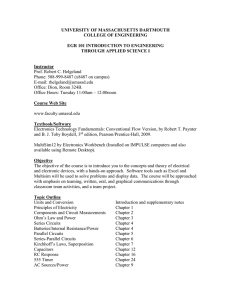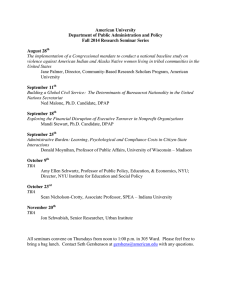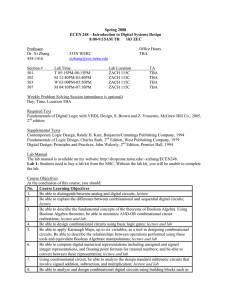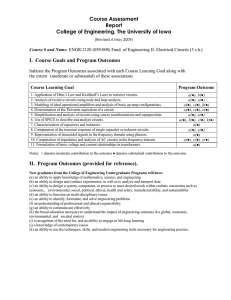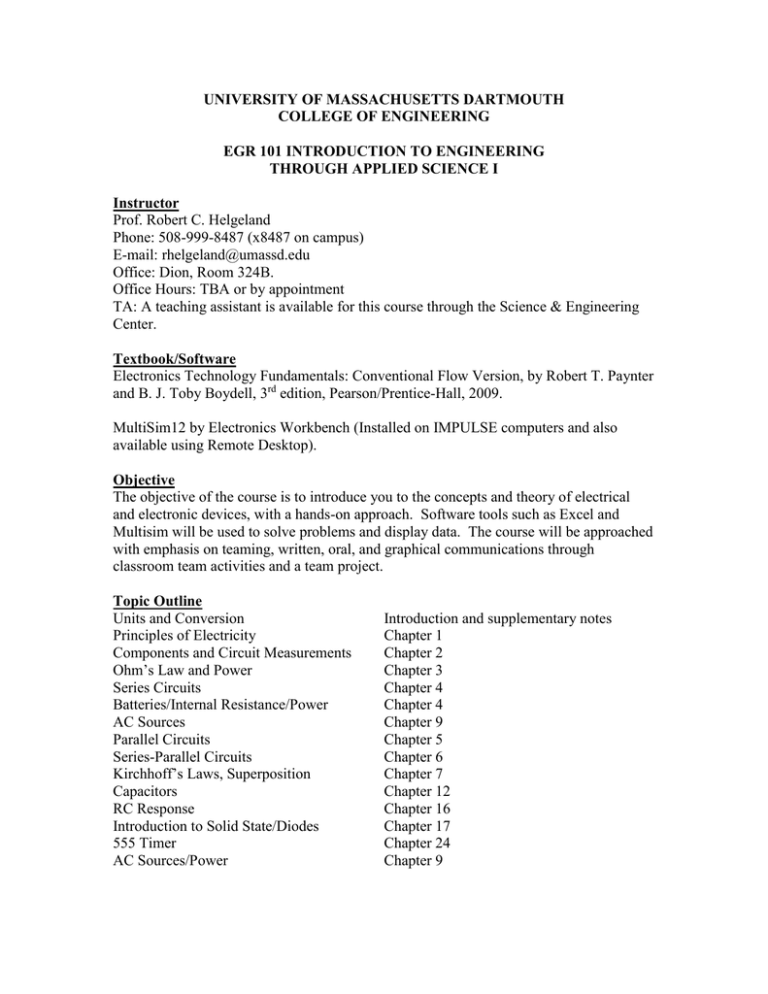
UNIVERSITY OF MASSACHUSETTS DARTMOUTH
COLLEGE OF ENGINEERING
EGR 101 INTRODUCTION TO ENGINEERING
THROUGH APPLIED SCIENCE I
Instructor
Prof. Robert C. Helgeland
Phone: 508-999-8487 (x8487 on campus)
E-mail: rhelgeland@umassd.edu
Office: Dion, Room 324B.
Office Hours: TBA or by appointment
TA: A teaching assistant is available for this course through the Science & Engineering
Center.
Textbook/Software
Electronics Technology Fundamentals: Conventional Flow Version, by Robert T. Paynter
and B. J. Toby Boydell, 3rd edition, Pearson/Prentice-Hall, 2009.
MultiSim12 by Electronics Workbench (Installed on IMPULSE computers and also
available using Remote Desktop).
Objective
The objective of the course is to introduce you to the concepts and theory of electrical
and electronic devices, with a hands-on approach. Software tools such as Excel and
Multisim will be used to solve problems and display data. The course will be approached
with emphasis on teaming, written, oral, and graphical communications through
classroom team activities and a team project.
Topic Outline
Units and Conversion
Principles of Electricity
Components and Circuit Measurements
Ohm’s Law and Power
Series Circuits
Batteries/Internal Resistance/Power
AC Sources
Parallel Circuits
Series-Parallel Circuits
Kirchhoff’s Laws, Superposition
Capacitors
RC Response
Introduction to Solid State/Diodes
555 Timer
AC Sources/Power
Introduction and supplementary notes
Chapter 1
Chapter 2
Chapter 3
Chapter 4
Chapter 4
Chapter 9
Chapter 5
Chapter 6
Chapter 7
Chapter 12
Chapter 16
Chapter 17
Chapter 24
Chapter 9
Evaluation Process
1. Laboratory and Homework
20%
Homework solutions & laboratory results must be presented neatly using
engineering paper. On top, always print your name, the course number, section
and team number.
Submit homework on the due date. No late homework will be accepted.
2. In-class Activities
10%
As part of the active-learning environment, you will be given in-class
assignments that you are expected to complete during the time allotted. For
most of these assignments, you will be asked to work in pairs and turn in a
single result either as a computer printout or on engineering paper with your
names and team number on it.
3. Two Exams, 15% each
30%
Common to all sections. The Exams will be given for two hours outside
normal classroom hours. Place & Date TBA. On the week of the exam, one
class session will be canceled and converted into an optional review session,
which will be announced in time.
There is NO makeup for any exam.
4. Project
15%
You will be given a separate handout.
5. Final Exam
25%
Common to all sections. Place & Date TBA.
Expectations
Dedication to IMPULSE, which requires limited work hours on or off
campus, and time management skills.
Attending each class.
Being punctual.
Bringing the textbook, engineering paper and a calculator to every class.
Being ethical and professional. Professionalism begins on day one in the
COE, not after graduation.
Observing code of conduct:
o No electronic gadgets of any sort that the instructor considers
unacceptable, especially iPods.
o Cell phones and pagers set in silent mode.
o No food or drinks of any type in the classroom.
Practicing professional habits:
o Using engineering paper.
o Presenting the work neatly.
o Including units.
o Boxing the answers.

